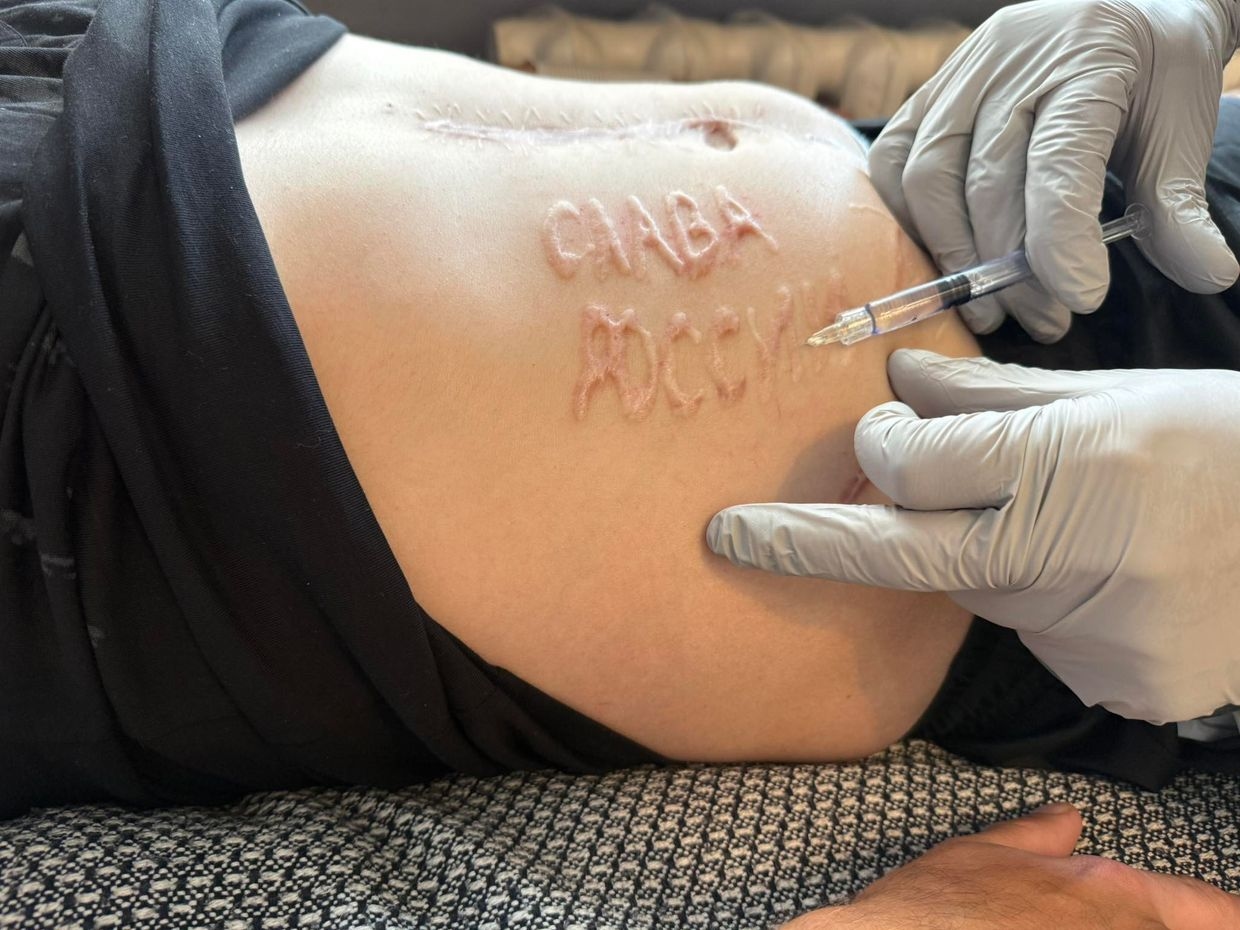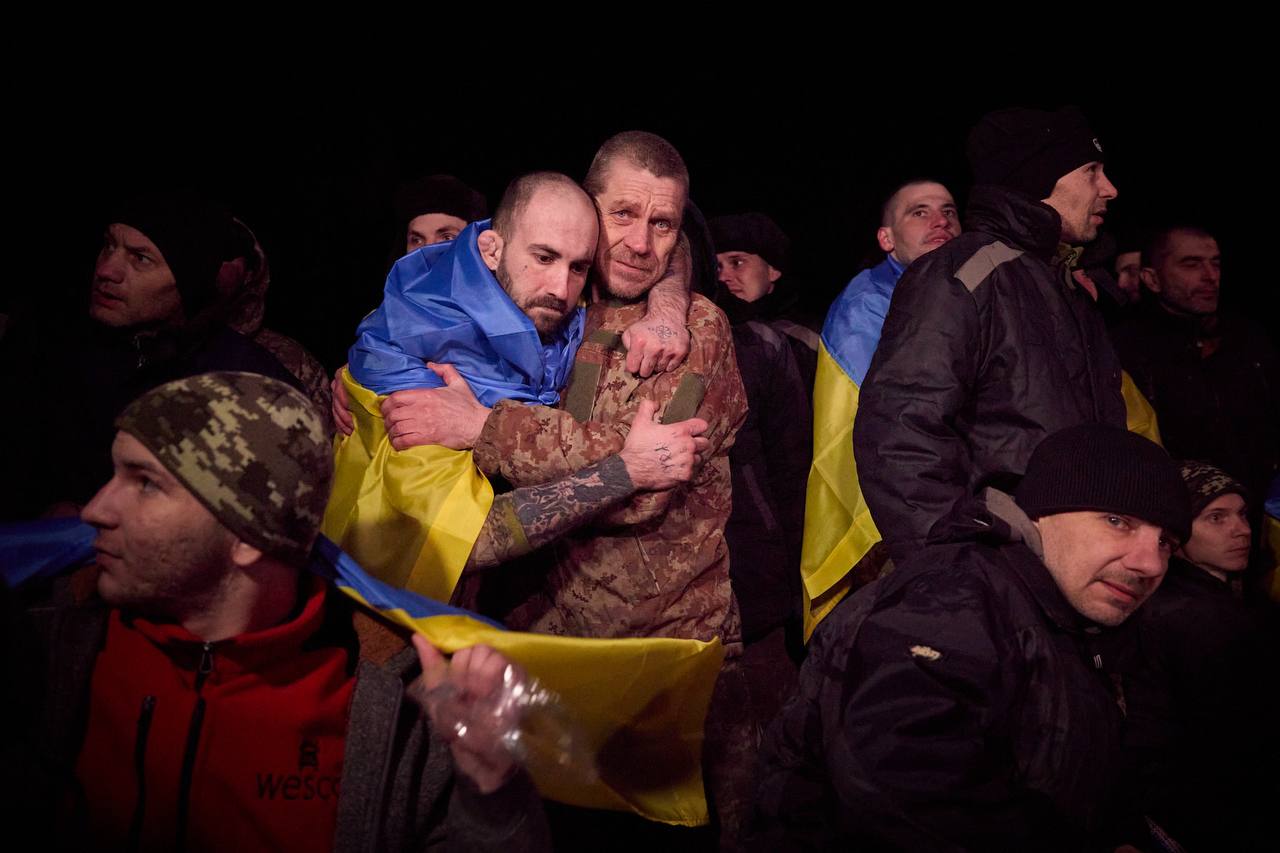Years of torture, abuse in Russian captivity take shocking toll on Ukrainian POWs

A Ukrainian soldier who returned from Russian captivity is photographed while undergoing rehabilitation in an unspecified location in Ukraine, on June 6, 2024. (Kostiantyn Liberov / Libkos / Getty Images)
Editor’s Note: This article was selected through a vote by members of the Kyiv Independent’s community. Become our member today and join our exclusive members-only Discord channel, where you can discuss and suggest stories, ask our journalists questions, and more.
This article contains graphic descriptions.
In almost two years of Russian captivity, former Ukrainian marine Vladyslav Zadorin lost 60 kilograms — half his body weight — along with his gallbladder and nearly his toes. He returned home with lasting disabilities and deep trauma.
Captured on the first day of the full-scale invasion in 2022 while defending the strategically important Snake Island, 35 kilometers off the coast of Ukraine’s Odesa Oblast, Zadorin was held in seven detention centers across Russia and occupied Ukrainian territories. He recalls starvation, constant beatings, electrocution, rape, and castration among the methods of violence used against Ukrainian prisoners of war (POWs).
“They used needles under our nails and constantly set dogs on us. They forced us (POWs) to fight each other in the corridor (of the prison),” Zadorin, now 26, told the Kyiv Independent.
“They smashed bottles over our heads — as a result, I suffered a closed head injury, and I was left with a permanent disability. They also smashed three vertebrae in my spine with a hammer. To this day, I can’t get them fixed — it still hurts and affects my health.”
Routine torture and inhumane treatment make every day in Russian captivity a nightmare for thousands of Ukrainian POWs. According to the UN, over 95% of released prisoners report having been tortured.

As of summer 2025, 6,400 soldiers and civilians had been released from Russian captivity, while thousands more remain captive. Ukraine has pushed for an “all-for-all” exchange, but Russia has so far rejected the proposal.
Just like Zadorin, many POWs return with disabilities — losing teeth, limbs, organs, and in some cases, even their lives after coming home.
“We now see more and more cases when people are freed from captivity, only to die two or three months later. The longer a person spends in those conditions, the more devastating the consequences,” Mariia Klymyk, head of the department for the protection of servicemembers and their families at Media Initiative for Human Rights, told the Kyiv Independent.
“Even if after release they receive proper nutrition, medical care, and rehabilitation, the years of abuse take such a toll that the body eventually breaks down and simply stops working.”
‘We were in hell’
Zadorin says the treatment of POWs varies depending on the facility. According to him, the harshest conditions and the worst torture he experienced were in a detention center in the Russian city of Kursk, while the one in Sevastopol, occupied Crimea, was comparatively easier.
According to him, Ukrainian POWs often heard Russian prison guards being ordered to “inflict the maximum harm on prisoners, both physically and psychologically.”
“To break us as much as possible, so we would feel that we were in captivity, that we were in hell.”
For Ukrainian POWs, the so-called “intake” into a Russian prison is a terrifying first step, where they face harsh treatment and humiliation.
“You would run down that corridor, being beaten from all sides. Then they would strip you naked and apply the stun gun to every part of your body.”
“There was a long corridor, where these special forces stood in a staggered formation. Each of them held different objects that could be used against you: Batons, clubs, stun guns, brass knuckles, glass bottles,” Zadorin recalls.


“You would run down that corridor, being beaten from all sides. Then they would strip you naked and apply the stun gun to every part of your body.”
Harsh interrogations, beatings, torture, and humiliation are a daily reality in Russian captivity.
According to Zadorin, some prisoners also endure sexual abuse, rape, and castration. But because the topic is highly sensitive and rarely discussed in public, little is known about how widespread this is.
He recalls a Ukrainian POW who was subjected to constant sexual abuse by prison guards for several months: “Even simple actions, like being touched from behind during a morning inspection while restrained against the wall, could make him freeze, shake, or urinate out of fear,” Zadorin says.
Due to constant and severe beatings, one Ukrainian POW developed a “massive abscess on his back” and would lose consciousness from the pain, Zadorin says.
Beyond the brutality of beatings and torture, POWs face starvation, while receiving no medical care — all of which severely undermines their health.

“We almost had no water, and what we had from the tap was of terrible quality and yellow. Because of that, my gallbladder had to be removed; it had turned into a solid stone,” Zadorin says.
“They gave me size 41 shoes, while I wear 45. As a result, my toes almost had to be amputated in Ukraine because they had started rotting. But luckily, my toes were saved and healed.”
Lifetime of scars
Even spending just a couple of months in Russian captivity can have lifelong effects on POWs’ health.
According to Maksym Turkevych, CEO of Neopalymi (“Unburned”), a national program that provides free medical care for war injuries, POWs regularly return with a range of scars and physical deformities.
“Beatings alone can result in fractures, dislocations, internal organ bruising or rupture, internal bleeding, skull damage, and even brain injury,” Turkevych told the Kyiv Independent.
“The consequences of torture can be severe and varied. We’ve seen cases where soldiers and civilians were subjected to electric shocks, including one man who was electrocuted so badly that he ultimately required double amputations of his lower limbs.”
Turkevych says they have also treated patients with marks from cuts, whether random or deliberate inscriptions, including the case of a Ukrainian POW with a “Glory to Russia” scar, which shocked the world earlier in June.
“Unfortunately, these kinds of injuries are quite common, and they affect many military personnel,” says Turkevych.

Klymyk says they also often record people returning with severe diseases such as hepatitis, tuberculosis, HIV, or even late stages of cancer.
“It’s possible that the disease had already started developing at the time of their mobilization, but because they never had a proper medical examination, it went undetected — and in captivity, no one pays attention to such things,” she says.
Stomach cancer is the most common diagnosis, and women often return from captivity with gynecological cancers, a result of both extreme stress and insufficient healthcare, according to her.
“Many have died of tuberculosis (upon their release) because they couldn’t receive timely treatment (in captivity),” she says.
“Even though nowadays tuberculosis is not fatal under proper medical care, in captivity it becomes deadly. We have testimony about five prisoners who literally ‘burned out’ because they were left untreated.”
Zadorin recalls that whenever prisoners complained of a headache, a guard would hit them on the head with a baton and then ask if it still hurt, so they avoided asking for help to escape further beatings.
“In one case, a man whose tongue had been cut asked for medical help. The medic, seeing him bleeding heavily, simply told him to keep his mouth shut to stop the flow,” Zadorin recalls.
Klymyk says that the constant, daily use of electric shocks takes a heavy toll on the POWs’ hearts.
“As a result, many young men suffer from heart problems after leaving captivity. They are also at risk of strokes and other health issues,” she says.
While an all-for-all exchange remains a distant hope for Ukraine, the treatment of Ukrainian POWs in Russian captivity could be somewhat improved if the International Committee of the Red Cross (ICRC) had regular access to them — something Russia continues to refuse as well.
“They know no one will stop them, no one will hold them accountable,” Klymyk says. “And so they do whatever they want.”
Note from the author:
Hi! Daria Shulzhenko here. I wrote this piece for you. Since the first day of Russia's all-out war, I have been working almost non-stop to tell the stories of those affected by Russia’s brutal aggression. By telling all those painful stories, we are helping to keep the world informed about the reality of Russia’s war against Ukraine. By becoming the Kyiv Independent's member, you can help us continue telling the world the truth about this war.











